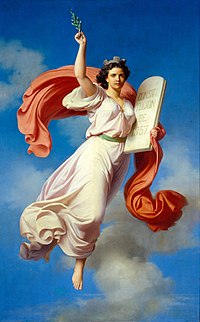
| Part of a series on |
| Liberalism |
|---|
 |
Liberalism in Mexico was part of a broader nineteenth-century political trend affecting Western Europe and the Americas, including the United States, that challenged entrenched power.[1] In Mexico, liberalism sought to make fundamental the equality of individuals before the law, rather than their benefiting from special privileges of corporate entities, especially the Roman Catholic Church, the military, and indigenous communities. Liberalism viewed universal, free, secular education as the means to transform Mexico's citizenry. Early nineteenth-century liberals promoted the idea of economic development in the overwhelmingly rural country where much land was owned by the Catholic Church and held in common by indigenous communities to create a large class of yeoman farmers. Liberals passed a series of individual Reform laws and then wrote a new constitution in 1857 to give full force to the changes. Liberalism in Mexico "was not only a political philosophy of republicanism but a package including democratic social values, free enterprise, a legal bundle of civil rights to protect individualism, and a group consciousness of nationalism."[2] Mexican liberalism is most closely associated with anticlericalism.[3] Mexican liberals looked to the U.S. as their model for development and actively sought the support of the U.S., while Mexican conservatives looked to Europe.[4]
- ^ John Britton, "Liberalism" in Encyclopedia of Mexico, Chicago: Fitzroy Dearborn 1997, 738.
- ^ Perry, Laurens Ballard. Juárez and Díaz: Machine Politics in Mexico. DeKalb: Northern Illinois University Press 1978, 340-41
- ^ Perry, Juárez and Díaz, 342
- ^ Olliff, Donathan C. Reforma Mexico and the United States, 4